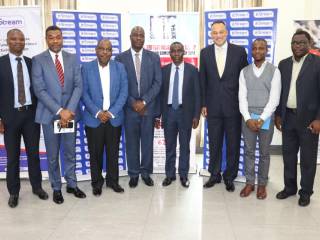The Executive Vice Chairman of the Nigerian Communications Commission, Professor Umar Danbatta, has said that building a robust broadband network will impact education, health, energy, agriculture, security and indeed all sectors of the economy because ICT has been positively expressed in all aspects of the Nigerian economy.
Danbatta, represented by Oluwatoyin Asaju, Deputy Director, Spectrum Administration, NCC, said this yesterday in a paper presented at the e-World News Magazine Forum 2019 held at Oriental Hotel, Lagos.
The Executive Vice Chairman of the Nigerian Communications Commission, Professor Umar Danbatta, has said that building a robust broadband network will impact education, health, energy, agriculture, security and indeed all sectors of the economy because ICT has been positively expressed in all aspects of the Nigerian economy.Danbatta, represented by Oluwatoyin Asaju, Deputy Director, Spectrum Administration, NCC, said this yesterday in a paper presented at the e-World News Magazine Forum 2019 held at Oriental Hotel, Lagos.
Danbatta noted that the International Telecommunications Union (ITU) and UNESCO maintain that improving the livelihoods of citizens around the world through sustainable development is a great challenge that can be easily mitigated by utilizing broadband.
The EVC reiterated that this is the reason NCC has been focused on facilitating the expansion of the nation’s broadband network. At the moment the licensing and output-based subsidy negotiations with six (6) Infrastructure Companies (InfraCos) based on the Open Access Model has been finalized. The companies will cover Lagos as an entity as well as the extant geopolitical configuration of country, and NCC will continue to make spectrum resources available to all operators.
Danbatta affirmed that with additional deployment of broadband infrastructure, broadband – “High Speed Internet which could largely be delivered through Optic Fibre, Wireless Spectrum and High Throughput Satellites” – of a speed not less than 1.5Mbps, will be reviewed upwards to enable strong connectivity.
The NCC Chief Executive then called on government at all levels to curtail issues of multiple taxation, multiple regulation, Right of Way issues, timely and simplified approval processes for site acquisition and harmonized right of way charges. He emphasized that these are some of the challenges bedeviling the telecom sector and they have to be satisfactorily and conclusively addressed in order to enhance the spread of broadband to un-served and underserved areas of Nigeria and to improve the quality of service.
Concluding his remarks, Danbatta returned to his original thesis and declared: “if you build an efficient broadband network, everything else will follow. The ability to control energy use; ability to manage healthcare in isolated populations; ability to deliver education; ability to better care for our environment; ability to streamline transport networks; and ability to improve public safety”.
